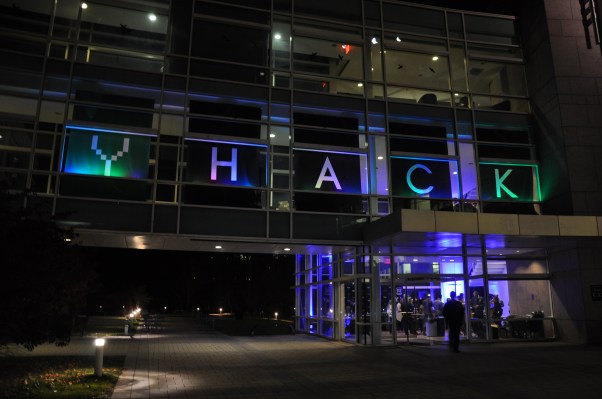The organizers of the hackathon at Yale this weekend aren’t exactly sure how many students turned out for the sleepless grind. Gauging from the depletion of YHack t-shirts, they put it at about 950.
That’s about 915 more people than came last year, when a group of students organized a mini-hackathon that one participant described as, “Wasn’t great.”
With about 150 participants making the haul from Canada, a handful flying in from England, and hundreds more arriving from schools across the US, the hackathon that wrapped up this evening was definitely better than that and adds one more event to the circuit of major college hackathons that includes PennApps, MHacks, HackMIT, and HackRU. In the spirit of building the intercollegiate hacker culture, a number of the organizers of those events also came out to help at Yale this weekend.
A large part of the motivation to hold a major hackathon on campus is to build a brighter, more cohesive programming environment on Yale’s campus. Projects are fractured among the student body or limited to problem sets for class, said Frank Wu, a sophomore and one of the YHack organizers. As far as post-grad career choices go, working in tech is not high up on the list.
This weekend’s hacks were pretty awesome across the board, and the littered pizza boxes were many. Here are the winners and finalists, as presented at this evening’s closing ceremonies.
Winning hack: Rainman
Created by two Yale seniors, Rainman gives context to news articles. It’s a major help for those times when you want to educate yourself about, say, Syria but don’t want to toggle between the story and a few reference tabs. The Rainman Chrome extension pulls up relevant Wikipedia articles as a sidebar to the main story. Those articles are pulled based on the keywords in the article, comparing the frequency with which a word appears in the piece to a larger corpus of articles. It’s the type of hack that would be incredibly useful in real life and gets at how we read news articles now, in conjunction with other reference materials.
Second place: Lux
Lux deals with the issue of indoor fluorescent lights that mess with your internal clock and keep you awake long after you’ve tried to go to sleep. The Yale-based team’s idea is that lightbulbs should be smarter and change hue and brightness depending on the time of day with no prompt from the owner, although they can also be controlled with an app. It’s like f.lux for real life.
Third place: cHat
Retro in the best way possible, this hack uses a text interface as a replacement for video chat services that often freeze up. Imagine a wall of text that creates a pixelated, black and white video image and you’ve got the idea. Text is a simple way to get data across, and as the Carnegie Mellon students who made it said, “The bandwidth is, like, zero.”
The other finalists included Leaf, a Pebble-based hack that uses handshakes as a way to swap contact information at networking events; Hacksearch, a Facebook graph search that lets you include fields that don’t exist, like popularity and attractiveness; Subtle Glass, an Android app that translates spoken word into text using Google Glass; and Laser Lock, which makes data transference possible through LED light.
It’s worth noting that the kids on the Laser Lock team MacGyvered part of the hardware for their hack using foam rockets that YHack was giving out as swag and a bunch of Doublemint gum wrappers. And it worked.
